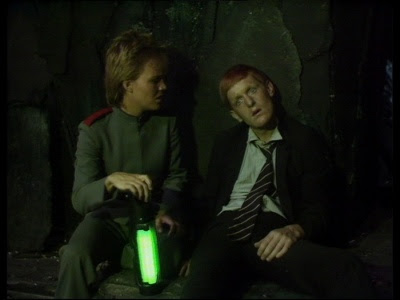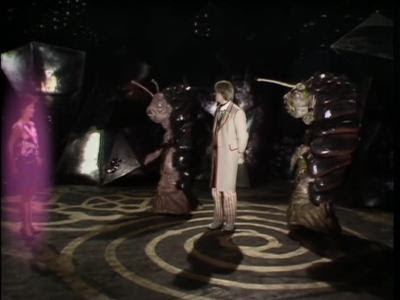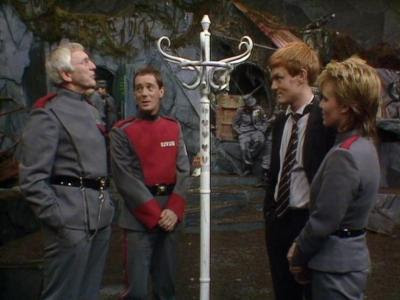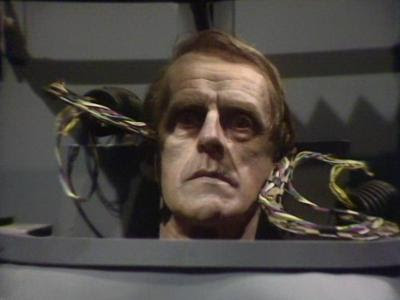Frontios
>"The Earth Is Hungry"
Back in ye ancient days of 1984, there was I with my shiny video tapes that I could just afford in order to record a mere three stories of the new season just about to start. Of course back then we didn't really know that these would all be available on VHS let alone shiny DVD as now, so it was crucial to decide what to go for. Having pored over the descriptions of what to expect from the Anniversary Special, I ended up with "the dalek story", "the regeneration story" and "the new doctor story". With hindsight, I would actually have recorded Resurrection and Androzani as before, but my other choice would have been Frontios!
The story still stands up well today as one of the better stories of the Davison era. With Chris Bidmead at the helm the script was going to be sound, Paddy Kingsland to provide his usual atmospheric scores, a competent director in Ron Jones, and great design by David Buckingham, what could go wrong. Well, all-in-all, nothing at all - if anything its the confines of the studio that perhaps let it down, with cave-setting always quite tricky to realise - Androzani had similar issues - but in both cases lighting was actually used to great advantage, but one wonders how it might have seen in real caves on film ...
 This is also one of those rare stories that enabled Mark Strickson to act and Turlough to have some measure of character. It was a real shame he hadn't been used better during his tenure on the show, and it's only his creator Peter Grimwade and Bidmead that really brought Turlough to life. The scenes of his dribbling race-memory-recall are excellent, though it's a bit handy that his home planet just happens to be one that the Tractators invaded in the past!
This is also one of those rare stories that enabled Mark Strickson to act and Turlough to have some measure of character. It was a real shame he hadn't been used better during his tenure on the show, and it's only his creator Peter Grimwade and Bidmead that really brought Turlough to life. The scenes of his dribbling race-memory-recall are excellent, though it's a bit handy that his home planet just happens to be one that the Tractators invaded in the past!
Ah, yes, the Tractators ... why is it the "monster" can make and break a story, in spite of how great a script it has. Fortunately they don't get too much "in the way" in the story, and it's a shame that in a typical lack of communication between departments we have dancers contracted to move the "lithe" creatures, and the designers created an "intractable" (ahem) costume that fails to provide any grace whatsoever!
 The Gravis was an interesting idea, but its threats did seem a little easy to ignore -the novelisation does much to address this so you could really feel the unease of whether he'd grasp that Tegan was not a Gallifreyan serving machine after all. Hmm, actually, he is a bit thick not to realise the Doctor's little tricks even down to his eventual defeat by his own hands!
The Gravis was an interesting idea, but its threats did seem a little easy to ignore -the novelisation does much to address this so you could really feel the unease of whether he'd grasp that Tegan was not a Gallifreyan serving machine after all. Hmm, actually, he is a bit thick not to realise the Doctor's little tricks even down to his eventual defeat by his own hands!
Also, the minimal visual effects used do seem a little basic, and it's a shame that the DVD producers didn't take the time (or rather, given the budget) to upgrade the effects to a more modern look rather than fuzzy red blurs illustrating the Tractator kinetic abilities. Not that this detracts from the story itself.
"The TARDIS has been destroyed"
 Even back at broadcast I thought it strange that the Doctor would be going on about his hatstand, not knowing how much of a mcguffin that would be (or even what the word meant back then :)). It's later poingnancy as being the only remaining part of the ship was a real impact back then, even if I knew we had several more stories to go so the TARDIS couldn't really be gone. Actually, at the time I suspected the chameleon circuit had worked ... but no it was actually dispelled into separate components within our own natural dimensions instead and providing a magical moment when Tegan comes across roundels in the tunnels - still highly effective even now!
Even back at broadcast I thought it strange that the Doctor would be going on about his hatstand, not knowing how much of a mcguffin that would be (or even what the word meant back then :)). It's later poingnancy as being the only remaining part of the ship was a real impact back then, even if I knew we had several more stories to go so the TARDIS couldn't really be gone. Actually, at the time I suspected the chameleon circuit had worked ... but no it was actually dispelled into separate components within our own natural dimensions instead and providing a magical moment when Tegan comes across roundels in the tunnels - still highly effective even now!
Still not sure how the Gravis knew of the Doctor by reputation, TARDISes and Time Lords when this was meant to be so far into the future they weren't meant to be there - if he were just a legend by then I'd have thought there'd be more excitement over him being there (a Tractator equivalent of an autograph wanted?!!). But then as we established earlier he is thick, and can't add up too well either - he'd been stranded for millennia but was on Frontios 500 years ... [actually a deleted scene clarifies this so maybe I should cut him some slack :)]
"The people of my planet"
As I said earlier, Turlough is used well in the story, but it seems weird now how he goes on about his planet without actually saying it. Unknown at this time, of course, but Trion is mentioned just three weeks later!
 Plenty of bits to catch the eye in the story, but quite a lot cut out too it seems (which you can see in the deleted scenes bit). I must say the episode pace is pretty good so the extra to-ing and fro-ing cut helps the broadcast version keep running well. And it wasn't until just now watching it that I realised that episode three is essentially just "running around corridors!". Speaking of which, a good "revere-lation" (sorry!) at the end of the ep with Ron Jones choosing not to use a "crash-in to the Doctor's face" for once - hoorah! - especially with the nasty-looking excavation machine turning up (which again the novelisation makes even nastier than on screen).
Plenty of bits to catch the eye in the story, but quite a lot cut out too it seems (which you can see in the deleted scenes bit). I must say the episode pace is pretty good so the extra to-ing and fro-ing cut helps the broadcast version keep running well. And it wasn't until just now watching it that I realised that episode three is essentially just "running around corridors!". Speaking of which, a good "revere-lation" (sorry!) at the end of the ep with Ron Jones choosing not to use a "crash-in to the Doctor's face" for once - hoorah! - especially with the nasty-looking excavation machine turning up (which again the novelisation makes even nastier than on screen).
Always good to see the Doctor's glasses in use (another Bidmeadism).
The restored picture looks great and some great camerawork (like looking up out of the tunnels to the ship), but the clean-up does also show up the Tractators a bit, and also where the scene was speeded up in order to make them look like they could move faster! There's also the unintentionally funny scene of the guards beating up a Tractator with their battons to watch out for!
The production notes also point out some of the inevitable continuity errors: I clearly remember the incident with the metal bar blocking the doors "moving" higher to enable the escape back at broadcast, but never noticed things like Turlough's blazer switching from buttoned up to open, Norna crouching to look in the tunnel (from below) but then standing (from above), or a boom shadow (though this doesn't detract and looks 'natural' anyway).
"A risk shared is a risk doubled"
All in all, a great story and also a great cliffhanger ending too, harking back to the old Hartnell story-telling days (not that I knew this at the time) - it's a shame they didn't retain the Resurrection trailer that immediately followed the end titles when it was broadcast just to maintain that flow :)







